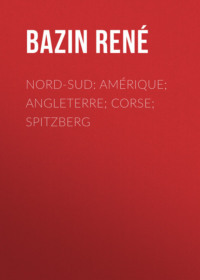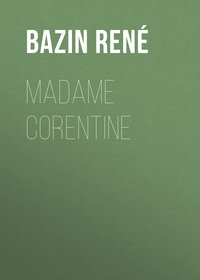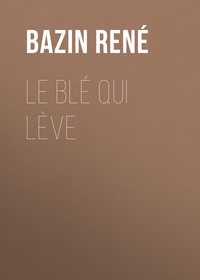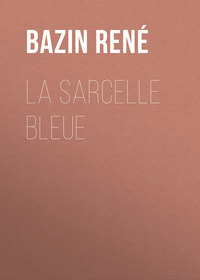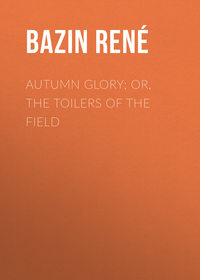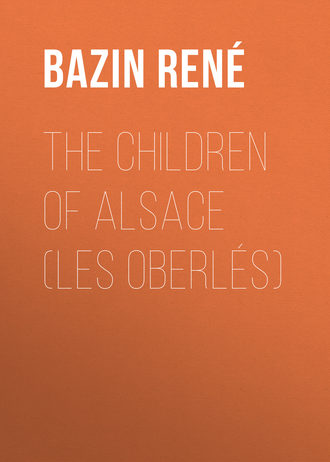 полная версия
полная версияThe Children of Alsace (Les Oberlés)
Seeing Jean Oberlé, whom he had often dandled on his knees, he made a movement of surprise.
"Is it you, my boy?" he said, in the dialect of Alsace, which he mostly used, and with which he was more familiar than with French. "What has happened to bring you here?"
"Nothing, M. Bastian, if not that I have just come home."
He held out his hand to the old Alsatian, who took it, pressed it, and suddenly lost that gaiety which had been in his welcome, for he thought: "It is now ten years since your father last came here, ten years that your family and mine have been enemies." But he only said, in answer to himself, and as if doing away with an objection:
"Come in all the same, Jean; there is no harm for once."
But the gladness of the first meeting was gone, and did not return.
"How did you know that I was on your land?" asked Jean, who did not understand. "Did you hear me?"
"No; I heard the blackbird. I thought it was my servant, whom I have sent to Obernai to get the lamps of my victoria mended. Come into the hall."
He thought, with a feeling of regret and reprobation: "As your father used to come in when he was worthy."
In the corridor to the left he opened a door, and both went into the "big room," which was at the same time the dining-room and the reception-room of this rich citizen, heir of lands and of the traditions of a long series of ancestors, who had only left the house at Alsheim for the cemetery. Nearly all the picturesque furniture which one still meets with in the old houses of rural Alsace had disappeared from the dwelling of M. Bastian. No more carved cupboards; no more chairs of solid wood, with the backs cut in the shape of hearts; no clock in its painted case; no more little weights at the windows. The few chairs in the big, square, light hall, the table, the cupboard, and the big chest, on the top of which was the cast of a Pietà not known to fame, were all of polished walnut. The only thing that was old was the historical stove of faience, bearing the signature of Master Hugelin of Strasburg, and of which M. Bastian was as proud as if it had been a treasure. About two-thirds down the room, between the stove and the table, a woman of about fifty was sitting, dressed in black, rather stout, having regular, thick features, bands of grey hair, the forehead almost without lines, fine long eyebrows, and eyes as dark as if she had come from the south, calm and dignified, which she lifted first to Jean and then to her husband as if to ask, "How does he come here?"
She was sewing the hem of an unbleached linen sheet, which fell about her in big folds. Seeing Jean enter, she dropped it. She remained dumb with surprise, not understanding how her husband could bring to her the son, educated in Germany, of a renegade father, traitor to Alsace. During the war she had had three brothers killed in the service of France.
"I met him coming to see me," M. Bastian said, as if to excuse himself, "and I begged him to enter, Marie."
"Good day, madame," said the young man, who was hurt by the astonishment and coolness of Madame Bastian's first glance, and who had stopped in the middle of the hall. "Old memories brought me here."
"Good day, Jean."
The words died away before reaching the walls, papered with old peonies. One could hardly hear them. The silence which followed was so cruel that Jean grew pale, and M. Bastian, who had shut the door, and who, a little behind Jean, was scolding gently, with a shake of the head, those beautiful, severe eyes of the Alsatian woman, which did not lower themselves, intervened, saying:
"I have not told you, Marie, that I saw our friend Ulrich this morning in our vineyards of Sainte Odile. He spoke to me of this boy's return to Alsheim. He assured me that we ought to congratulate ourselves that we are going to see his nephew settle in the country. He told me that he was one of ours."
The silent lips of the Alsatian wore a vague smile of incredulity, which died as the words died. And Madame Bastian again began to sew.
Jean turned round, pale, as yet more miserable than irritated, and said in a low voice to M. Bastian:
"I knew that our two families were divided, but not to such an extent as they evidently are. I left Alsheim some time ago. You will excuse me for having come."
"Stay, stay! I will explain to you. Believe me that we have nothing against you, no animosity whatever, neither one nor the other."
The old man placed his hand on Jean's arm in a friendly manner:
"I do not want you to go like that. No; since you are here I will not let you say that I have sent you away without doing the honours. The thought would weigh heavy on me. I will not!"
"No, M. Bastian, I ought not to be here. I am in the way; I cannot stay one instant."
He moved to go away. The solid hand of the old Mayor of Alsheim fastened round the wrist he held. His voice rose and became harsh.
"Presently. But do not at least refuse the civility I am accustomed to show to all who come here. It is the custom of the country and of the house. Drink with me, Jean Oberlé, or I shall repudiate you, and we shall not even recognise each other."
Jean remembered that no house in the country round Barr or Obernai, not even the oldest and richest, possessed better recipes for making beam-tree-berry brandy or cherry brandy, or elderberry wine, or wine made with dried grapes, or spring drinks. He saw that the old Mayor of Alsheim would be deeply hurt by a refusal, and that the offer was a means of showing his cordiality without disavowing in words, or in thought, the mother, queen, and mistress of the big house, who continued to ignore the guest, because the guest was the son of Joseph Oberlé.
"So be it," he said.
Then M. Bastian called, "Odile!"
The hands that held the linen, near the stove, rested on the folds of her black dress, and for half a minute there were three human beings, each with very different thoughts, who awaited her who was going to enter at the end of the room, on the right, near the great walnut cupboard. She came out of the shadow of a neighbouring room and advanced into the light, while Jean controlled his feelings and was saying to himself, "I did well to remember her!"
"Give me the oldest brandy that we have," said the father.
Odile Bastian had at first smiled at her father, whom she saw near the door, then she had, with a movement of her brown eyebrows, shown her astonishment, without displeasure, when she recognised Jean Oberlé near him; then the smile had disappeared when she saw her mother, bending over her work-table, dumb and holding herself aloof from what was going on around her. Then her bosom heaved, the words she was going to say were arrested before reaching her lips; and Odile Bastian, too intelligent not to guess the affront, too much a woman to emphasise the secret trouble, had simply and silently obeyed. She had sought a key in the drawer of a chest, had gone to the big cupboard, and raising herself on the tips of her toes, one hand leaning on one of the doors at the top of the piece of furniture, her head thrown back, she ransacked the depths of the hiding-place.
She was just the same girl, but more developed, who had lived in Jean's memory for years, and who had followed him over the world. Her features were not regular. But in spite of that she was beautiful, with a strong, glowing beauty. She seemed like the statues of Alsace, which one sees on monuments and in French souvenir pictures, like those daughters of rich and warlike blood, wrathful and daring, while near them a more feminine Lorraine weeps sadly. She was tall; there were no hollows in her full cheeks, curving to a chin as firm and pink. It is true she did not wear the wide bows of black ribbon which make two wings on the head, but that only accentuated the unusual, the exceptional beauty of her hair, which was of the colour of ripe corn, of a perfectly dull, even tint, bound in bands round her temples and there twisted and raised on her head. Her eyebrows were of the same colour, long and finely marked, and the lashes, and even the eyes, slightly apart, where dwelt a soul at rest, were deep and passionate. In a moment M. Bastian had on a stand two glasses of cut crystal and a big-bellied black bottle. He took the bottle in one hand and with the other he drew out, without shaking it, a cork which swelled out as it left the neck, being damp as sapwood in spring time. At the same time a smell of ripe fruit was diffused under the beams of the room.
"It is fifty years old," said he, pouring a little of the liqueur into each of the glasses.
He added seriously, "I drink to your health, Jean Oberlé, and to your return to Alsheim!"
But Jean, without answering directly, and with every one silent, and looking at Odile, who had withdrawn to the cupboard, and who, standing erect against it, was also looking at and studying her old playfellow returned to his native country, said:
"I drink to the land of Alsace!"
By the tone of the words, by the gesture of the hand raising the little sparkling glass, by the look fixed on the end of the room, some one understood that the land of Alsace was here personified and present. The tall, beautiful daughter of the Bastians remained motionless, leaning against the cupboard, which framed her in its yellowish shadow. But her eyes had the brightness that wheat has when it waves at a breath of wind in the sunshine, and without turning her head, without ceasing to look straight in front of her, her eyelids slowly lowered and shut, saying thank you!
And that was all.
Madame Bastian had not even looked up. Odile had said not a word – Jean bowed and went out.
The old Mayor of Alsheim rejoined him outside.
"I will go with you to the other end of my garden," he said, "for it is better for us – for you – and for your father, that you should not be seen coming down the avenue. You will seem to be coming from the fields."
"What a strange country this has become!" said the young man in an angry tone. "Because you do not hold the same opinions as my father you cannot receive me, and when I leave you I must do so secretly, and after having had to submit to the insult of a silence which was hard to bear. I can tell you that!"
He spoke loudly enough to be heard from the house, from which he was only a few steps away. The usual paleness of his complexion was more noticeable, and emotion contracted the muscles of his neck and jaws, and all his face had a tragic expression.
M. Bastian led him on.
"I have another reason for taking you that way," he said, "it will be longer, and I have things to explain to you."
They took a path that was not gravelled, which went by the plane-trees, passed a kitchen garden and then crossed a little wood.
"You do not understand, dear boy," said M. Bastian, in a voice which was firm without being harsh, "because you have not yet really lived among us. It has not changed; what you see dates back for thirty years."
Through an opening in the trees they saw a little bit of the plain, with the belfry of Barr in the distance, and the blue Vosges mountains above and beyond.
"Formerly," continued M. Bastian, pointing vaguely to the country, "our Alsace was just one family. Big and little knew each other and lived happily together. You know that even now I make no difference between rich and poor, between a citizen of Strasburg and a wood-cutter from the mountain. But what is done is done – we have been torn away, against our will, from France, and treated brutally because we did not say 'Yes.' We cannot revolt – we cannot drive away our masters, who know nothing about our hearts or our lives. But we do not admit them to our friendship, neither them nor those amongst us who have taken the side of the stronger."
He stopped speaking for a moment, not wishing to say all that he thought on this subject, and went on, taking Jean's hand.
"You are very angry with my wife because of her reception of you; but you are not the cause of it, neither is she. Until the doubt which rests on you is lifted, you are he who was educated in Germany, and the woman you have just seen is this country. Reflect – you must not bear a grudge against her. We have not all been faithful to Alsace, we men; and the best of us have compromised and have more or less recognised the new master. Not so the women – Ah! Jean Oberlé, I have not the courage to disclaim them even when you whom I love so well are the subject. Our Alsatian women are not insulting you in any ordinary way when they do not receive you; they are defending their country, they are carrying on the war." The old man had tears in his red and wrinkled eyes.
"You will know me later," said Jean.
They were at the end of the little park before a wooden door as mouldy as the other. M. Bastian opened it, shook the young man's hand and stayed a long time at the end of the wood watching Jean go away and get smaller on the plain, his head bent against the wind, which was still blowing, and more violently.
Jean was troubled to the depth of his soul.
Between him and each family in this old country he felt he was going to find his father. He was suffering from having been born in the house towards which he was going. He saw the image of Odile as the only sweet thing of this first day, and her eyes were slowly, slowly closing.
CHAPTER V
COMPANIONS OF THE ROAD
The winter did not allow M. Oberlé's ideas about the professional education of Jean to be carried out exactly. The snow which remained on the summits of the Vosges, without being thick, made travelling very difficult. So Jean paid only two or three visits to the wood-cutting centres situated near Alsheim and in the Vosges valleys. The excursions to more distant places were put off for a warmer season. But he learned to cube a pine or a beech without making a mistake, to value it according to the place it occupied in the forest, according to the height of the trunk below the branches, the appearance of the bark, which indicated the health of the tree, and by other calculations into which a kind of divining quality enters, which cannot be taught anywhere, and which makes the expert. His father initiated him into the working of the factory and the management of the machines, the reading of agreements, and the traditions of fifty years kept up by the Oberlés regarding sale and carriage contracts. He put him into relationship with two officials of the administration of the forests of Strasburg, who showed themselves very ready to be of service, and proposed to Jean to explain to him personally the new forest legislation, of which he still knew but little. "Come," said the younger, "come to see me at my office, and I will tell you more things you will find it useful to know than you will learn in books. For the law is the law, but the administration is another thing."
Jean promised to profit when occasions offered themselves. But several weeks went by without his having the time to go to the town. Then March came in mildly and melted the snows. In a week, and much earlier than usual, the brooks swelled to overflowing, and the high peaks of the Vosges and Sainte Odile which one could see from Alsheim, which had had their slopes and paths white with snow, appeared in their summer robes of dark and pale green.
The walks round Alsheim were going to be exquisite and such as the young man had pictured to himself in his youthful memories. The home, without being a model of family unity, had witnessed no repetition of the painful scene which occurred the day after Jean's return. In each camp words were noted and deeds observed, which would one day become arguments and subjects of reproach and discussion, but just now there was a sort of truce brought about by different causes.
In M. Joseph Oberlé it was the desire not to be wrong in his son's eyes; for his son was going to be useful, and he did not wish to be accused of provocation. In Lucienne it was the diversion which the presence of her brother had brought into her life, and the interest, not yet exhausted, that she took in his tales of travel and student life. In Madame Oberlé it was fear of making her son suffer, and of alienating him by letting him see the family feuds. Nothing had really changed. There was only a superficial gaiety, an appearance of peace, a truce. But although Jean felt that the agreement of the hearts and minds around him was not real, he enjoyed it because he had spent long years in moral solitude.
The worries and clashing of interests came from elsewhere, and were not wanting. Nearly every day Jean had occasion to go through the village of Alsheim, which was built on each side of three roads forming a fork, the handle of which was the mountain side, and the two prongs towards the plain. At the bifurcation was the tavern, the Swan, which took up a corner of the church square. A little farther on, on the left road leading to Bernhardsweiler, dwelt the German workmen engaged by M. Joseph Oberlé, and lodged in little houses all alike, each with a little garden in front. So that in whatever part of Alsheim he showed himself, the young man could not help reading, in the faces and gestures of those he met, different opinions, and all equally distressing. The Germans and their wives – the workmen, better disciplined and more tame-spirited than the Alsatians, fearing all authority without respecting it, quartered in a corner of Alsheim by the hatred of the population on which they hoped to take vengeance some day, when they should be the more numerous, having with the other inhabitants no ties of origin, family, customs, or religion – could only have indifference or hostility for the master, which were badly disguised by the salutations of the men, and the furtive smiles of the women.
But many of the Alsatians were less under restraint. It was enough that Jean had entered the business and that he was seen constantly with his father, for their disapproval to extend to him. He saw himself covered with a prudent contempt, the kind that little people can always express towards powerful neighbours. The forest workmen, the labourers, the women, and even the children pretended not to see him when he passed, others withdrew into their houses; others, the old ones especially, watched the rich man come and go as if he had been from another country. Those who showed the most signs of respect were the tradesmen or the employés, or the relations of the employés of the house. And Jean found it difficult to bear the reopening of this wound each time he left the park.
On Sunday, at church, in the whitewashed nave, he waited for the coming of Odile. To reach the seat reserved for her family for years, which was the first on the Epistle side, she had to pass near Jean. She passed, with her father and her mother, without any of them appearing to know that Jean was there, and M. Oberlé, and Lucienne. She only smiled at the end of Mass, when she came down the aisle, but she smiled at whole rows of friendly faces, at women, old men, at big boys who would have died for her, and at the children of the choir, the chanters of the "Concordia," who scampered off by the sacristy door, to be able to salute, surround, and welcome at the door the daughter of M. Bastian, the Alsatian girl, the friend, the beloved of all this poor village; she did not give away more money than Madame Oberlé, but they knew that there was no division in her house, no treachery, and that the only difference between it and the other houses in the valleys and mountains of Alsace was its wealth. What did she think of Jean? She, whose eyes never spoke in vain, did not look at him. She who used to speak to him in the roads now said nothing.
The first month of Jean's new life passed away like this in Alsheim. Then spring was born. M. Joseph Oberlé waited two days and then, seeing the buds of his birch-trees burst in the sunshine, he said to his son on the third day:
"You are a good enough apprentice now to go alone and inspect our timber-yard in the Vosges. You will get ready to start. This year I have made exceptional purchases. I have cuttings as far as the Schlucht, and to visit them you will have to visit nearly all the Vosges. I give you no instructions, only observe, and bring me a report, in which you will note down your observations of each of our cuttings."
"When shall I start?"
"To-morrow, if you like – the winter is over." M. Oberlé said that with the assurance of a man who has had need to know the weather like a peasant, and who knows it. He had, before speaking, ordered a list to be prepared of the cuttings of wood bought by the house either from the German State or from the Communes, or from private people, with the detailed directions on the position they occupied in the mountains, and he gave this list to Jean.
There were a dozen cuttings distributed over the whole length of the Vosges, from the valley of the Bruche on the north to the mouth of the Schlucht.
The next day Jean put a little linen and a change of shoes in a bag, and without telling any one of his intention hurried to the mountain, and up to the lodge of Heidenbruch.
The square house, with green shutters, and the meadow, and the forest all round the clearing, were smoking as if a fire had devoured the heath and grass, and left the beech and pines intact. Long wreaths of mist seemed to emanate from the soil, and to grow tenuous, and uniting, lose themselves in the low clouds, which glided along, rising from the valleys and going up the slopes towards the invisible monastery of Sainte Odile. The humidity penetrated to the very depths of the forests. It was everywhere. Drops of water shone on the pine needles, streamed in threads down the bare trunks of the beeches, polished the pebbles, swelled the many mosses, and travelling over the land, and flowing on dead leaves, went to swell the brooks, whose cadenced song could be heard on all sides – the grasshopper of winter whose song never ceases.
Jean went up to the middle of the wooden palisade painted green, which surrounded Heidenbruch, passed through the gate, and in the front of the lodge called out gaily to the windows closed because of the fog, "Uncle Ulrich."
A cap appeared behind the window panes, the cap of an Alsatian woman who takes care of her big black ribbons – and under the cap there was the smile of an old friend.
"Lise, tell uncle!"
This time the last window to the left opened, and the refined face, the eyes of a watcher, the pointed beard of M. Ulrich Biehler were framed between two shutters thrown back against the white wall.
"Uncle, I have at least a dozen wood-cutting places to visit. I begin this morning, and I come to take you for a companion, to-day, to-morrow, and every day…"
"Twelve journeys in the forest," answered his uncle, who leaned, his arms crossed, on the window sill, "this is a fine ending to Lent! My compliments on your mission!" He looked at his nephew in walking-clothes, his strong, masculine face raised in the fog; he was thinking that one could have sworn that he was a French officer, and then, carried away by his imagination, he forgot to say whether or not he would accompany his morning visitor.
"Come, uncle," continued Jean. "Come! Don't refuse me! We will sleep in the inns; you will show me Alsace."
"I walked seven leagues yesterday, my friend!"
"We will only do six to-day."
"You really want me to come?"
"An absence of three years, Uncle Ulrich, think of that, and a whole education to go through!"
"Well! I won't refuse you, Jean; I am too delighted that you should have thought of me. I have even a second reason for agreeing to the journey and to thank you for it. I will tell you presently."
He shut the window. In the silence of the woods Jean heard him call the old valet, who was second in command in Heidenbruch.
"Pierre! Pierre! Ah! there you are! We are going for twelve days into the mountains. I take you with me. You will pack my bag; put it on your back with my nephew's bag. Take your shoes with the nails, your stick, and you will go in front to the halting-place, while Jean and I go to visit the cuttings. Do not forget my waterproof, nor my pocket medicine chest."
Going into the house, the young man saw Uncle Ulrich, full of business and radiant, pass him, open the drawing-room door, go to the wall, take down a long object in copper on two nails, and go quickly upstairs again.
"What are you taking away, uncle?"
"My telescope."


